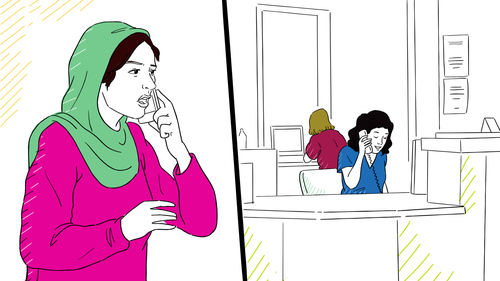Mental Health in the U.S.

Types of Emotional Support
You may feel stressed, sad, or overwhelmed during your resettlement journey or in daily life. It’s normal to experience these feelings and it’s okay to ask for emotional support if you need it. Emotional support can come from many different sources. Some examples include:
People in Your Life. You might find support through friends and family, mentors, or coaches. Teachers and faith leaders can also provide guidance during difficult times.
Therapy or Counseling. Therapists and counselors support you to develop ways to understand and cope with your feelings. In the U.S., many people talk to a therapist or counselor for help with their feelings, even if they don’t have serious problems.
Support Groups. Support groups provide support from other people coping with similar problems. Some support groups include creative activities, like art or cooking. You can find support groups for specific people, like mothers or teenagers. Support groups can also help you make new social connections in your community.
Medication. Medication can help reduce worry, improve sleep, and support overall emotional wellbeing. Medications are often prescribed by primary care providers or psychiatrists. People who take medicine usually meet with their doctor regularly to see how well the medicine is working.
It’s important to know that providers and interpreters must keep what you share private unless they are concerned you might hurt yourself or someone else. This means that your provider and interpreter will not tell your family, friends, or community about your thoughts, feelings, or conversations.


Choosing a Provider
Finding a provider that works well for your concerns and your schedule may take time. As you are looking for a provider, consider:
Health Insurance Coverage. Certain providers accept health insurance, and some are considered “out of network.” You should ask if the provider, organization, or support group accepts your health insurance and if there are any additional fees or payments.
Interpretation. You have the right to interpretation in your preferred language at no cost from any health organization that receives federal money. Tell the hospital or clinic staff that you need an interpreter when you make the appointment or arrive for emergency care.
Accessibility. Check the provider’s location, what hours are available for your treatment, and how long you might wait to receive services. You can also ask if the provider will see you in an emergency.
Treatment. You can ask if your provider has a similar cultural background or has worked with newcomers before. You can also ask if they have experience helping with the kind of concerns you have.
Remember that choosing a provider is a personal decision. It’s important to find a provider you trust and feel comfortable with. If you need help finding services, ask your primary care provider, caseworker, Resettlement Agency, or sponsor for help.


Disclaimer: The IRC received competitive funding through the U.S. Department of Health and Human Services, Administration for Children and Families, Grant #90RB0052 and Grant #90RB0053. The project is 100% financed by federal funds. The contents of this document are solely the responsibility of the authors and do not necessarily represent the official views of the U.S. Department of Health and Human Services, Administration for Children and Families.
